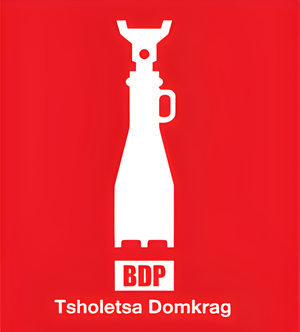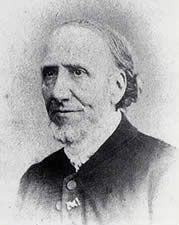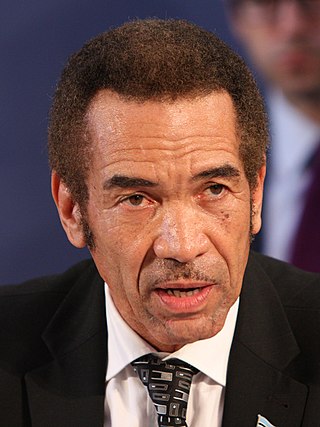
Botswana, officially the Republic of Botswana, is a landlocked country in Southern Africa. Botswana is topographically flat, with approximately 70 percent of its territory being the Kalahari Desert. It is bordered by South Africa to the south and southeast, Namibia to the west and north, and Zimbabwe to the northeast. It is connected by the Kazungula Bridge to Zambia, across the world's shortest border between two countries.
The Batswana, a term also used to denote all citizens of Botswana, refers to the country's major ethnic group. Prior to European contact, the Batswana lived as herders and farmers under tribal rule.

The economy of Botswana is currently one of the world's fastest growing economies, averaging about 5% per annum over the past decade. Growth in private sector employment averaged about 10% per annum during the first 30 years of the country's independence. After a period of stagnation at the turn of the 21st century, Botswana's economy registered strong levels of growth, with GDP growth exceeding 6–7% targets. Botswana has been praised by the African Development Bank for sustaining one of the world's longest economic booms. Economic growth since the late 1960s has been on par with some of Asia's largest economies. The government has consistently maintained budget surpluses and has extensive foreign-exchange reserves.

Gaborone is the capital and largest city of Botswana with a population of 246,325 based on the 2022 census, about 10% of the total population of Botswana. Its agglomeration is home to 421,907 inhabitants at the 2011 census.
Pula is a city in Istria, Croatia.

The Botswana Democratic Party is the governing party in Botswana. Its chairman is the Vice-President of Botswana, Slumber Tsogwane, and its symbol is a lift jack. The party has ruled Botswana continuously since gaining independence from the United Kingdom in 1966. The BDP is sometimes classified as a paternalistic conservative party and is also a consultative member of the Socialist International since 2014, which is a group including many worldwide social-democratic parties.

Sir Seretse Goitsebeng Maphiri Khama, GCB, KBE was a Motswana politician who served as the first President of Botswana, a post he held from 1966 to his death in 1980.

The coat of arms of Botswana was adopted on 25 January 1966. The centre shield is supported by two zebras. The shape of the shield is that of traditional shields found in Southern Africa. On the top portion of the shield are three cogwheels that represent industry.

The pula is the currency of Botswana. It has the ISO 4217 code BWP and is subdivided into 100 thebe. Pula literally means "rain" in Setswana, because rain is very scarce in Botswana—home to much of the Kalahari Desert—and therefore valuable and a blessing. The word also serves as the national motto of the country.

Jules Pierre Verreaux was a French botanist and ornithologist and a professional collector of and trader in natural history specimens. He was the brother of Édouard Verreaux and nephew of Pierre Antoine Delalande.

The Gaborone City Council is the governing body of the city of Gaborone, Botswana. In terms of generated revenue, it is the wealthiest council in Botswana. It is composed of 30 councillors representing the wards of Gaborone.

Maru-a-Pula School is a co-educational, independent day and boarding secondary school in Gaborone, Botswana. It was founded in 1972.

Isaac Schapera FBA FRAI, was a British social anthropologist at the London School of Economics specialising in South Africa. He was notable for his contributions of ethnographic and typological studies of the indigenous peoples of Botswana and South Africa. Additionally, he was one of the founders of the group that would develop British social anthropology.

Botswana Television is the national broadcaster in Botswana. Botswana's first national television service started in 2000 following a 1997 government decision. The station delivers thirteen hours of local and international programmes daily on weekdays and 13 hours of programming on weekends.

Seretse Khama Ian Khama is a Motswana politician and former military officer who was the fourth President of the Republic of Botswana from 1 April 2008 to 1 April 2018. After serving as Commander of the Botswana Defence Force, he entered politics and was Vice-President of Botswana from 1998 to 2008, then succeeded Festus Mogae as President on 1 April 2008. He won a full term in the 2009 election and was re-elected in October 2014.

Botswana - People's Republic of China relations refers to the current and historical relationship between the Botswana and the People's Republic of China. Relations were first established on 6 January 1975. In 2010, upon the 35th anniversary of relations being formalized, the relationship between the two states was considered "strong" and "rapidly growing" by then Chinese ambassador to Botswana, Liu Huanxing. Botswana follows the One China Policy which means Botswana does not have relations with the Republic of China (Taiwan). Following the 2008 Sichuan earthquake in China, the Botswana government donated one million pula.
Prostitution in Botswana is not illegal, but laws such as public disorder, vagrancy, loitering and state recognised religious provisions are used to prosecute prostitutes. Related activities such as soliciting and brothel keeping are illegal. Botswana has made proposals to make prostitution legal to prevent the spread of AIDS. However, there has been mass opposition to it by the Catholic Church. Prostitution is widespread and takes place on the street, bars, hotels, brothels and the cabs of long-distance trucks.
Capital punishment in Botswana is a legal penalty, and is usually applied for murder under aggravated circumstances. Executions are carried out by hanging. There is on average one execution per year, and the execution usually takes place some years after the trial. One execution was carried out in 2016, two in 2018, one in 2019, and one in 2020.
Botswana continued to address the COVID-19 pandemic in 2021, beginning its vaccination process through the importation of vaccines. On November 11, Botswana was the location of the first documented case of the SARS-CoV-2 Omicron variant. 2021 also saw the discovery of two diamonds in Botswana that exceeded 1000 carats, becoming the third and fourth largest diamonds ever discovered. In relations with its neighbouring countries, Botswana continued to address violence at the Botswana–Namibia border, and it entered into the conflict in Cabo Delgado in support of the government of Mozambique.
The Pula Fund is the sovereign wealth fund of Botswana. As of October 2023, the fund has US$4.1 billion in assets under management.













